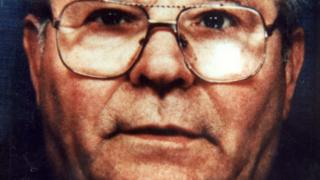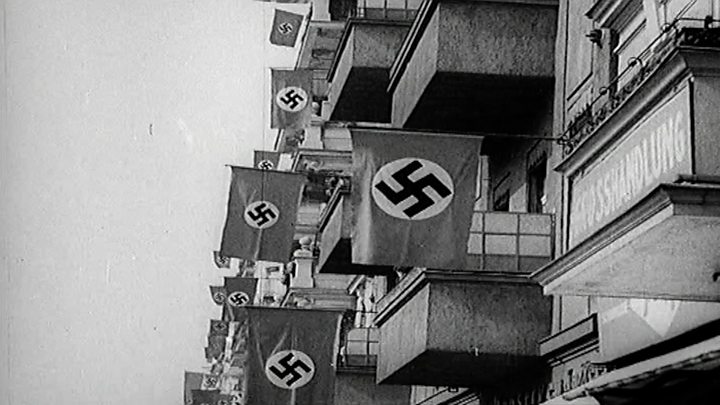 Image copyright
Image copyright
John Kingston
Investigators were preparing to search the home of Stanislaw Chrzanowski in Telford when he died
A pensioner has become the first person from the UK to be investigated in Germany for his alleged role in the Holocaust in World War Two.
Stanislaw Chrzanowski, 96, from Shropshire, was being investigated in Munich for the murder of civilians in his home town of Slonim in Belarus.
He died in October not knowing he was under investigation.
German prosecutors confirmed they were now looking through immigration records for possible new suspects in the UK.
The unprecedented case has been hailed a landmark in Nazi war crime investigations, clarifying to German prosecutors who they can investigate.
Image copyright
John Kingston
Mr Chrzanowski is believed to have murdered civilians while an auxiliary with the Germans in his hometown of Slonim
They say it means anyone who served in a German unit can now be prosecuted – regardless of their nationality, the nationality of their victims or where the crimes were committed – as long as there is an accusation of murder.
Meanwhile, a separate BBC investigation has identified a roster of auxiliary policemen who served the Nazis in Slonim who could also potentially face investigation.
Mr Chrzanowski, who lived in Hadley, Telford, came to Britain after being taken as a prisoner of war and joining Allied forces.
His case was first brought to the attention of British police when his stepson John Kingston, of Holmfirth, West Yorkshire, sent a dossier of evidence to the Metropolitan Police’s war crimes unit.
He suspected his stepfather because of stories he allegedly told Mr Kingston when he was a child.

In the 1990s, Mr Kingston, who died last week, went to Slonim where he met people who claimed they saw Mr Chrzanowski, an auxiliary working with invading Nazi troops, shooting prisoners at the death pits in the forests.
He was questioned by Met detectives, but no action was taken as the Crown Prosecution Service said there was insufficient evidence.
The case was reopened a year ago when Nazi war crime prosecutors based in Ludwigsburg, Germany, asked to see the interviews.
Mr Chrzanowski, who also lived in Holmfirth for a short time, had always denied he was a war criminal.
Image copyright
Getty Images
About 40,000 people are believed to have died in Slonim
Thomas Will, deputy Nazi war crime prosecutor in Ludwigsburg, believed there was sufficient evidence from the accounts to launch a criminal investigation and the federal court ruled last July that he could be tried in Germany, passing the case to prosecutors.
- Holocaust law wields a ‘blunt instrument’ against Poland’s past
- Holocaust Memorial Day: A Nazi in the family
Shortly before he died, Mr Kingston said: “I think it’s good that Germany should actually do something to try to put the past right.
“My stepfather is just one individual, and there were thousands like him, so it’s more important that he’s an example or a case in particular.”
Andrej Umanski, a legal expert at Cologne University, said: “I would say we are pushing the law to its maximum and showing that crimes like this will be punished even 70 years afterwards because they were so grave.”
Analysis: Nick Southall, BBC Radio Shropshire
The Stanislaw Chrzanowski investigation sends out a clear message: Germany has unfinished business when it comes to prosecuting Nazi collaborators.
This unprecedented move to investigate a UK resident has been made by a new generation of German prosecutors determined to make up for past failings to bring perpetrators to justice.
Even though Mr Chrzanowski and his alleged victims were not German, and his alleged crimes took place outside of Germany, it was ruled that the simple fact he was part of the Nazi German function meant he could be prosecuted.
The impact of this means we’re likely to see more trials – and they could involve British citizens.
I understand legal authorities in Germany have already started to look for possible new suspected Nazi collaborators in the UK following the Chrzanowski investigation, with immigration records being assessed.
Image copyright
John Kingston
Mr Chrzanowski came to England in 1944 after being taken as a prisoner of war and joining the Allied forces
A BBC investigation with leading holocaust researcher Dr Stephen Ankier has uncovered a roster of auxiliary policemen who served the Nazis in Slonim.
Dr Ankier located the roster, which listed 116 names, including Mr Chrzanowski’s. Being a member of the auxiliaries does not mean these people are guilty of war crimes, but the post-war trial of Slonim commander Gerhard Erren in Hamburg in 1974 showed some auxiliaries took part in executions.
It is believed others named on the list also switched to join the Allies and ended up in the UK. Most are now believed to be dead.
The BBC did not find any evidence linking Mr Chrzanowski directly with war crimes.
Telford pensioner investigated for Nazi war crimes

